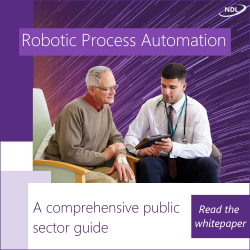
Inclusion and innovation are complementary elements of the thinking around digital at Dorset Council – and both are part of how it is aiming to change perceptions of the county.
Since its formation in 2019 it has run a series of initiatives for the adoption of new digital solutions in its own services, to support other sectors and promote the county as an attractive home for technology businesses.
These have been accompanied by an understanding that people need the skills and confidence to use digital services, and that building them throughout the community will help to reshape its image as somewhere that knows how to do things with digital tech.
Penny Syddall, Dorset’s programme manager for digital skills and adoption, says her role is focused on helping people in the county who need the skills, and that it goes beyond the usual groups at risk of digital exclusion.
“My job was to ensure people took a service when it became available,” she says. “When we took private broadband to rural areas people understood it, but I realised early on that some people were never going to take the service because they didn’t have the confidence, skills, devices or money to make use of the network.
“I became interested in them. People were being left behind further and further, so we put together a programme of digital inclusion.”
Sending out champions
It has involved measures that have been taken by other local authorities, notably that the council has sent a network of volunteer digital champions into libraries to introduce people to basic digital skills.
The effort has taken on a new dimension as the council has seen that it could not reach all the people it wanted to through this approach and needed to be more active at the points where they really need help.
“We thought we could train up people working on the housing register, or in libraries, or social workers, or in doctors’ surgeries, to direct them to digital champions,” Syddall says. “We’ve trained 930 of them. Some of them had the digital skills themselves and just needed permission to spend time with customers; some didn’t so we had to give them more confidence that they could teach somebody or where to signpost people. It was a mixture of things.
“Now they are out there helping people as part of their job and we reckon that we reach over 50,000 people per year.”
Device distribution
Dorset has also worked with national charity Good Things Foundation in providing devices to people who cannot afford them. This has been supported by funding from various sources and a scheme under which the council uses money it receives from sending its old computers for recycling to help buy new ones for the digitally excluded.
Syddall says the first phase involved the distribution of 94 devices. The second, Digital Doorway 2, has involved a pot of £100,000 that by August had supported 235 people.
Other initiatives have extended to helping local people develop higher level skills. The Dorset Digital Skills Partnership has been set up – involving the council, businesses, the local enterprise partnership for the county, local colleges and universities – bringing them together to understand skills gaps and identify where the support is available. This was done without any central government funding but Sydall says it has been very successful over the past two years.
The council has supported a series of coding days in local schools, aimed at opening up the possibilities of a career in technology for young people, and quickly learned how to take new approaches.
Code Playground
“We realised there were a lot of resources available to schools that were not being used, one of them the Barclays Code Playground, which is a fantastic resource to do sessions coding clubs,” Syddall says. “Only one school in the Dorset area was using it, a private school in Bournemouth, and we thought we could do better. If we put on something specially for Dorset schools maybe they would engage better.
“Barclays agreed to livestream sessions from schools in Dorset and BCP (Bournemouth, Christchurch and Poole). Schools can log in and code along, and it sets out what teachers and kids would need to have.
“Also, we saw it would be very good to have local tech businesses to send someone into the local schools to help with coding day and create a link between a local tech company and a school.”
Last year about 2,000 children were able to take part in the programme, a much higher number than expected, and about 40 businesses. Syddall says they have been asking when it will run again, and there is a plan for a coding week in early October.
By late August about 5,000 children had signed up along with more than 60 businesses, so there will almost one for each school. In addition, the council is going to record the Barclays session so schools can use it any time during the week.
Women in Tech
The council has also got behind the Women in Tech Dorset group, a community in which women can learn from each other in developing their skills and career paths. It runs a series of online and in-person events on a range of relevant issues.
In addition, it has set up a forum to funnel information on cyber security from experts to local businesses, and has been working on developing its understanding of the various support networks in place.
Underlying all this the council’s perception of digital inclusion and skills being closely related to its efforts to promote innovation in the county. It is expected to be an ongoing effort which, as Syddall says, is about ensuring that Dorset has a future as a digital place.





